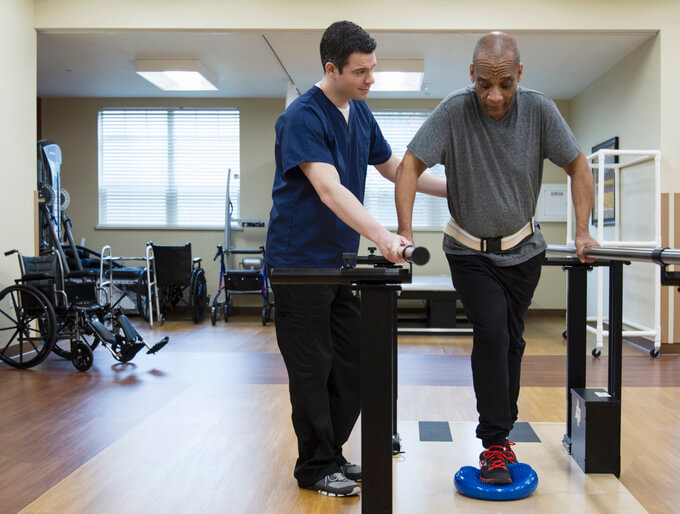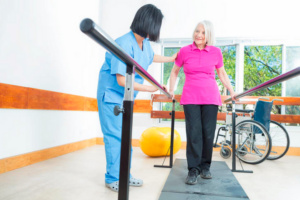Rehabilitation Nurse Career Overview
 Rehabilitation nurses specialize in providing care for patients recovering from chronic illnesses, injuries, and disabilities.
Rehabilitation nurses specialize in providing care for patients recovering from chronic illnesses, injuries, and disabilities.
They work closely with a multidisciplinary team of healthcare professionals, including physical therapists, occupational therapists, mental health professionals, and speech therapists, to help patients regain independence and improve their quality of life.
Rehabilitation nurses focus on rehabilitative healthcare and care plans tailored to each patient’s needs, with the goal of promoting recovery and preventing further health complications.
They also advocate for patients’ rights and ensure that the care provided is holistic and integrated across all team members.

Struggling to meet your deadline?
Get your assignment on Rehabilitation Nurse Career Overview done by certified MDs and PhDs in the USA. ORDER NOW!
Primary Responsibilities of a Rehabilitation Nurse
- Direct Patient Care: Rehabilitation nurses assess and provide care to patients dealing with chronic illnesses, disabilities, or recovery from serious injuries. Whether it’s a stroke recovery nurse, a nurse for brain injury patients, or a rehabilitation nurse for spinal cord injury, they offer personalized, compassionate care to help patients regain independence.
- Develop and Implement Learning Resources and Discharge Plans: Part of a rehabilitation nurse’s job involves creating educational materials that help patients and their families understand the recovery process. These plans are essential for stroke patients, individuals with chronic illnesses, and people recovering from disability or brain injury.
- Coordinate Nursing Care in Collaboration with Team Members: As part of a collaborative healthcare team, rehabilitation nurses work alongside physical therapists, physicians, occupational therapists, and speech therapists to ensure that care is cohesive and holistic.
- Serve as a Resource and Leader for Nursing and Healthcare Staff: Experienced rehabilitation nurses often take on leadership roles, guiding and mentoring other healthcare providers, especially those working in rehabilitation nursing jobs.
- Facilitate Community Education About People with Disabilities: Beyond the clinical setting, rehabilitation nurses engage with communities to raise awareness about disabilities and the needs of patients recovering from injuries or chronic illnesses.
- Advocate at the Legislative Level: Many rehabilitation nurses actively engage in patient advocacy on legislative issues, pushing for policies that benefit individuals with disabilities and chronic health conditions.

Key Skills for Rehabilitation Nurses
To succeed as a rehabilitation nurse, certain skills are essential:
- Client Advocacy: Advocacy is a key part of rehabilitation nursing. Nurses ensure that their patients’ needs are met and that they have access to the resources they need for recovery.
- Collaboration: Effective collaboration is crucial. Rehabilitation nurses work closely with other healthcare professionals such as physical therapists and speech therapists to create and implement effective treatment plans.
- Leadership: Nurses in this field often take on leadership roles within the healthcare team, guiding care strategies and offering support to other medical professionals.
- Research: Rehabilitation nurses contribute to the development of rehabilitation nursing care plans based on the latest evidence and research in the field.
- Teaching Skills: Rehabilitation nurses need to educate patients and families about their care plans and the recovery process. This also involves educating the community and other healthcare professionals about best practices in rehabilitation nursing.
Where Do Rehabilitation Nurses Work?
Rehabilitation nurses can work in a variety of settings depending on their specialization:
- Hospitals: Many rehabilitation nurses are employed in hospitals, working in specialized units where patients with severe injuries or chronic illnesses receive long-term care. Nursing care for brain injury patients or stroke patients is commonly provided in a hospital setting.
- Rehabilitation Centers: These facilities focus on providing intensive care to patients who are recovering from surgeries, disabilities, or injuries. Nurses in rehabilitation nursing jobs at these centers are responsible for overseeing patient care and ensuring that each individual is progressing in their recovery.
- Community and Home Health Facilities: Rehabilitation nurses who work in home health settings help patients recover from spinal cord injuries, stroke recovery, and chronic illness by providing in-home assessments, creating care plans, and offering support to patients and their families.
How to Become a Rehabilitation Nurse:
1. Earn an Associate Degree in Nursing (ADN) or a Bachelor of Science in Nursing (BSN):
The educational journey typically involves completing a two-year ADN at a minimum, with many employers preferring a four-year BSN. Both degrees qualify graduates to apply for registered nurse (RN) licensure.
2. Pass the NCLEX-RN to Receive RN Licensure:
Graduates of nursing programs must successfully complete the National Council Licensure Examination (NCLEX-RN) to become eligible for their RN license.
3. Gain Required Nursing Experience:
Licensed RNs seeking certification typically need to log two years working as professional rehabilitation nurses. Many graduate nursing programs also require a year or two of work experience.
4. Consider Pursuing a Rehabilitation Nurse Certification (CRRN):
Although voluntary, obtaining the Certified Rehabilitation Registered Nurse (CRRN) certification can enhance employment opportunities and potentially lead to higher salaries. Some employers may require or prefer certified applicants.
5. Explore Advanced Practice Options with a Master of Science in Nursing (MSN):
Rehabilitation nurses interested in assuming advanced practice roles can pursue an MSN degree over 2-3 years. This advanced degree equips them to lead in clinical practice, education, and research, often directing and managing rehabilitative care.
Embarking on a career as a rehabilitation nurse requires a commitment to ongoing learning, a passion for collaborative patient care, and a dedication to making a positive impact on the lives of individuals navigating chronic illnesses and disabilities.
Rehabilitation Nursing: Advanced Practice vs. RN Roles
Advanced Practice Registered Nurses (APRNs) specializing in rehabilitation and Registered Nurse (RN) rehabilitation nurses share some common responsibilities, but APRN-level practitioners take on additional supervisory, management, and research roles.
APRN Rehabilitation Nurse
Consultant: Identifies and coordinates cases, collaborates with third-party payers and other healthcare professionals, and advocates for clients.
Direct Care Provider: Manages patients, acts as a clinical expert, intervenes in crises, collaborates with interdisciplinary teams, and implements cost-effective technologies.
Manager: Recruits, trains, and evaluates staff, formulates policies and procedures, collects and assesses program data, and ensures the delivery of safe and high-quality services.
Researcher: Guides the development of research-based nursing, conducts, shares, or contributes to research, and directs data evaluation.
RN Rehabilitation Nurse
Caregiver: Assesses clients, develops and implements adaptable care plans, and evaluates and modifies care plans to achieve goals and objectives.
Client Advocate: Listens to and guides clients and families, advocates at the policy level, and helps clients succeed when returning to work or school.
Collaborator: Develops goals for clients, families, and rehabilitation teams, participates in conferences and meetings, and works with rehab team members.
Teacher: Educates nurses, clients, and families about diseases and disabilities.
How Much Do Rehabilitation Nurses Make?
According to Payscale, the average salary for RN-level rehabilitation nurses is $68,620 per year. Certification leads to salary increases and enhanced job opportunities, with the average Certified Rehabilitation Registered Nurse (CRRN) making $85,340 annually—earnings surpassing the average pay for all RNs.
The U.S. Bureau of Labor Statistics forecasts a 7% increase in RN jobs from 2019-2029. This growth exceeds the projected change in employment for all occupations, which stands at 4% for the same period. The demand for RNs is expected to rise due to an aging population facing increased instances of chronic illness and disabilities, often seeking care in long-term residential facilities or their homes.
Frequently Asked Questions About Rehabilitation Nurses
1. What does a rehab nurse do?
Rehabilitation nurses care for patients with chronic illnesses and disabilities, assisting them in transitioning back to independent living. They collaborate with interdisciplinary teams and work in various settings such as hospitals, clinics, rehabilitation centers, residential facilities, and home healthcare.
2. What is the difference between a rehabilitation nurse and a physical therapist?
Rehabilitation nurses work alongside a team of medical professionals, including doctors, therapists, and mental healthcare providers, to implement rehabilitation plans for patients with disabilities and long-term illnesses. While physical therapists may collaborate with rehab nurses, their focus is primarily on improving patients’ movement and mobility through therapy and prevention.
3. What is the role of a nurse in rehabilitation?
Rehab nurses, whether RNs or APRNs, take on roles as caregivers, collaborators, educators, and patient advocates. APRN-level practitioners often assume additional responsibilities as clinical experts, consultants, direct care providers, managers, researchers, and supervisors.
4. Can an RN become a physical therapist?
While RNs complete prerequisites for physical therapy in their ADN or BSN programs, becoming a physical therapist requires earning a doctorate in physical therapy, involving an additional 4-6 years of study. RNs transitioning to physical therapy also need to pass their state physical therapist licensure exam.
Resources for Rehabilitation Nurses
1. Association of Rehabilitation Nurses (ARN):
ARN offers CRRN certification, networking, educational resources, advocacy, and research support. Benefits include free continuing education, an online community, special interest groups, local chapters, volunteer opportunities, and publications.
2. The National Rehabilitation Association (NRA):
NRA advocates for individuals with disabilities and promotes ethical rehabilitation practice. Membership includes professionals in rehabilitation healthcare, counseling, education, and research, offering benefits like publications and an annual conference.
3. American Nurses Association (ANA):
ANA provides specialty certifications in areas relevant to rehabilitation nursing. Membership benefits include resources for career advancement, professional development, networking, and advocacy for nurses in all specializations. National Student Nurses’ Association members can join ANA free of charge.

Dont wait until the last minute.
Provide your requirements and let our native nursing writers deliver your assignments ASAP.

